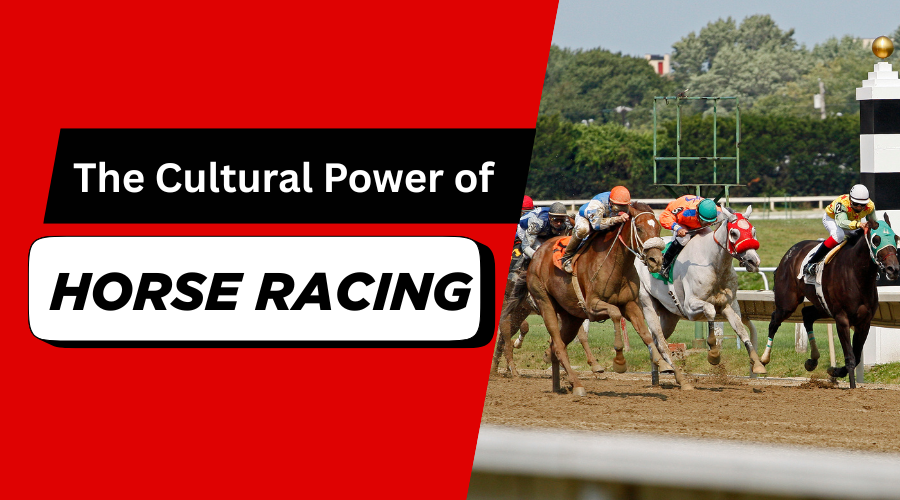The Cultural Power of Horse Racing: More Than Just a Sport

The thudding of horses' hooves on the track, the collective inhalation as horses enter the final turn, and the tension in the air: there's nothing like the thrill of a big horse race. But beneath the thrilling two-minute spectacle lies a cultural phenomenon that has impacted societies, economies, and individuals' lives for millennia. Horse racing is not only a sport; it's a living, dynamic cultural institution that captivates people everywhere on the globe.

150% Bonus - Reduced Juice

50% Bonus up to $1000

$750 Bonus - Tons of Betting Options
The Ancient History of a Modern Obsession
Horse racing has cultural significance dating back millennia. From chariot racing in ancient Rome to horse racing in Mongolia, people have been drawn to testing the speed and endurance of these gorgeous creatures for centuries. By the 12th century, English nobles were already racing their horses for prestige and pride, laying the foundation for what would later become an organized sport by the 1700s.
What makes horse racing so unique is the manner in which it has managed to remain beyond its sporting environment. Unlike most other sporting events, racing has become an integral part of national identity. The Kentucky Derby is not just a race; it's America's oldest continuously running sporting event, coupled with mint juleps and elaborate hats that are as much a part of the culture as the horses themselves. Similarly, Royal Ascot in the UK combines sport and pageantry to the point that it reflects and imposes British cultural heritage.
Beyond the Track: A Cultural Canvas
You'll find the extent of horse racing extending far wider than the racetrack. As many as 20% of great works of literature reference the sport, ranging from Tolstoy's "Anna Karenina" to Dick Francis's mystery novels. Films like "Seabiscuit" and "Secretariat" don't just document racing history; they use it as a setting to examine greater themes of perseverance and triumph.
But why does racing have such a firm grip on our collective imagination? Perhaps it's because these races create shared experiences that cut across social boundaries. At major races, you'll see people from all walks of life, wealthy owners in private boxes with run-of-the-mill fans clutching their racing sheets, all united in a shared passion.
The Personal Connection
Ask any racing enthusiast for their best day at the track, and you'll likely be recounting memories that last far longer than who took the checkered flag. Most can recall their first foray into betting on a horse race. The adrenaline rush of researching bloodlines, the friendly advice of a wiser companion, and that split second of terror when their chosen steed makes its dash.
I remember being taught to read a racing sheet at Saratoga by my grandfather. "Horse racing isn't about picking a name you like," he'd tell me. "It's about reading history, studying patterns, and occasionally, just following your gut." Today, after countless hours of deliberation, I placed a wager on a chestnut filly with odds that made winning appear improbable. When I passed the finish line ahead of all the others, the jubilation we exchanged with total strangers in our midst formed ties that united us despite our differences.
Economic Engine and Social Catalyst
The economic effect of the racing industry goes well beyond cultural significance. In the United States alone, horse racing generates more than $15 billion per year and supports some 470,000 jobs. Of that economic activity, roughly 30% happens in rural areas, and that helps to vitalize agricultural regions.
And while certainly the sport is not without its negatives, including some legitimate animal welfare concerns that the industry continues to address, there is also considerable good charitable endeavor that it raises. Major racing events typically have a charity connection, and some donate as much as 10% of their take to community endeavors.
A Tradition Worth Preserving
So why does this old sport remain so relevant in the modern era? Perhaps it's that horse racing offers something increasingly rare, a genuine experience that connects us with the past while creating new memories. With so much of our entertainment today being virtual, there's something profoundly satisfying about standing on the track as these magnificent animals demonstrate the work of centuries of breeding and training.
Horse racing teaches us that some traditions do not simply survive; they thrive because they remind us of something fundamental to the human experience: our love of beauty, our penchant for competition, and our desire to belong to something larger than ourselves. And that's a power of culture worth championing.
Chat 
Rules
The goal of chat is to talk sports and sports betting! Help each other by sharing picks and having a good time!
Below will not be tolerated
You can chat about most things to a certain extent. Exception is absolutely NO talking about Religion or Politics.
- There will be NO talking about others or their families
- There will be NO name calling.
- There will be NO rambling on or repeating the same thing over and over.
- There will be NO racist or sexist comments.
- There will be NO posting of other websites.
Basically treat others the way you would like to be treated.
Break the rules

- 1st warning a 24 hour ban
- 2nd warning 7 day ban
- 3rd warning a lifetime ban




